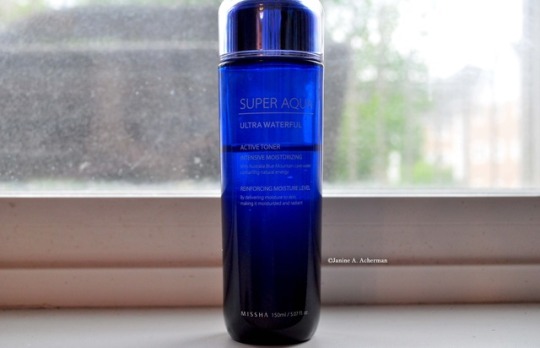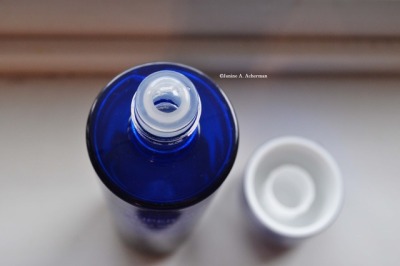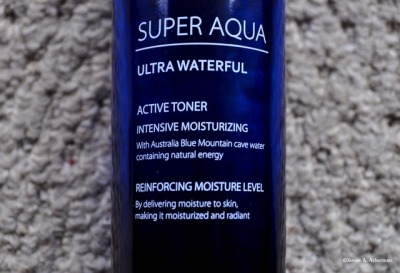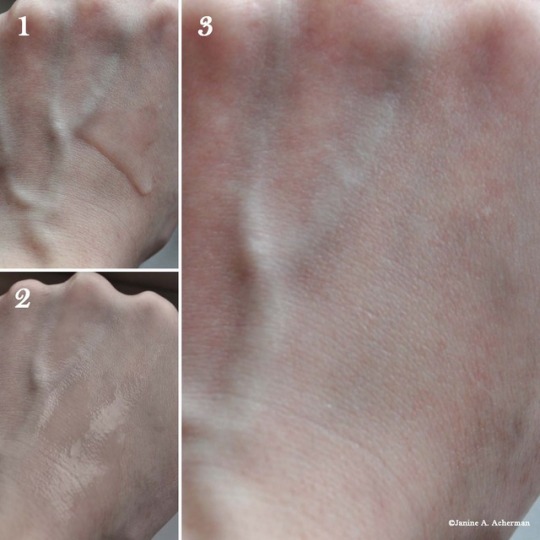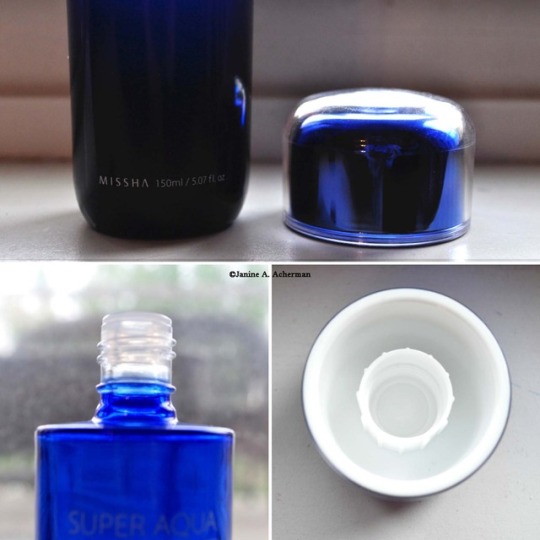Packaging: The product comes in a sturdy, glass bottle (150ml) with a plastic twist-off cap. The deep blue color reminds me of the ocean.
Price: It goes for $20 USD on MisshaUS, but I got it for sale off of Jolse for $18 USD. This thing will last you many months. I have had mine for about two months now, and as you can see, I am only about a quarter through. In my opinion, it is a bit expensive for what it is, but I will get back to this point in a moment.
Consistency: It resembles a watery essence or serum in that it is too thick to be described as water-like, but too runny to be called anything else. It kind of reminds me of the viscosity of my Hada Labo Gokujyun Lotion (Clear) that I reviewed in an earlier post. Upon application this product gives your skin a cooling sensation which I believe would make it a great product for the summer. It spreads easily and after it has absorbed, its finish is smooth and, thankfully, not at all tacky.
Scent: Because the bottle description adds that it has Australia Blue Mountain cave water in it, the scent immediately reminds me of mountains in the way that it seems so nice and fresh. It does not come off as strong to me like the majority of Missha products seem to, and it also does not linger at all.
Ingredients: A CosDNA analysis revealed that the only possible acne-triggering ingredients are the usual suspects: dimethicone (emollient) and butylene glycol (solvent + moisturizer), which are around the middle of the list. I know some people may want to avoid this product anyway because dimethicone is related to silicone, an ingredient known to cause clogged pores and acne in people with silicone-sensitive skin. Another possible culprit is mineral oil, which is the sixth ingredient on the list. As for me personally, this product has not broken me out at all.
Some ingredients stuck out to me when I first considered buying this product as they were high up on the list:
– Glycerin (second ingredient)
– Niacinamide (third ingredient)
– Seawater (seventh ingredient)
Glycerin, a glycerol-based emollient, attracts moisture from the air (i.e., a humectant), makes your skin feel smoother, and even promotes faster healing. Another interesting fact is that it makes other ingredients absorb more effectively than what you see with plain water or alcohol. A 2008 study mentioned that glycerol
is known to increase stratum corneum (SC) hydration, improve epidermal barrier function and decrease clinical signs of inflammation.
And as we already know, niacinamide promotes whiter, brighter-looking skin and helps fade post-acne scars.
Seawater, on the other hand, is something I have not seen before in any of my products. When I looked this up, there were numerous articles describing how seawater was beneficial in skin care, that it provided the skin with essential vitamins and minerals. It makes sense, I thought to myself, as to why this might be a rather good ingredient to include. But as I continued to research and look for actual studies involving topical usage of seawater, I found one study that took place in 2007 which painted a much different picture:
SW [seawater] immersion can cause time-dependent apoptosis [death of cells] and proliferation in the epidermis [skin], and the overall effect of SW immersion is injury to the epidermis.
I felt disheartened at first, but then I found a more recent study from 2013 that seemed conflicting when placed against the first study I mentioned:
Marine algae have gained much importance in cosmeceutical product development due to their rich bioactive compounds. […] The marine environment is enriched with a variety of organisms that harbor a wide range of biologically important compounds that are useful for the cosmeceutical benefit of humans.
From what I currently understand, algae is present in seawater; most of which come from seaweeds. So, this more recent study seems to trump the older one, in my opinion, only because the information provided as a whole was a lot more telling than the other, which involved hairless mice immersed in seawater for ridiculous amounts of time (3 hours, 6 hours, and 12 hours) – in other words, did not seem like the most reliable source to turn to in understanding how seawater might work in skin care products. The seawater is likely much less concentrated than pure seawater, and, being “immersed” for hours in it is a lot different than applying a small amount to the skin that absorbs in under a minute.
Overall Review: Despite the promising ingredients it contains, I found that the actual outcome of using this product for about two months was rather disappointing. As a hydrating toner, it only felt hydrating on my skin as I applied it, but would not have any long-lasting effects or make any crazy changes to the quality of my skin like other hydrating toners I have tried. But still, this toner is a simple one that would likely work well for all skin types and be a great starting point for those who are new to using hydrating toners. I find it basic in that it does help following products absorb better (like most toners are expected to do) and maintains the quality of my skin. 3.5/5.


